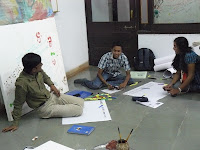Today, we have a guest post for you, written by an Indian Youth. Enjoy it!
I am at age of late twenties, completed the academic goals and struggling to have a professional career of my choice. Why should I be bother about environment? There are so many things of my immediate concern.
This is not the case with youth today. We have seen very active youth participation in various national and international forums like UNFCCC Conference of Parties (COP), Convention of Biological Diversity (CBD) and Earth Charter etc. where the youth have not just registered their presence but were also intervene in the discussion and contributed to the final results.
But why youth today is so much concern about protecting environment?
Remembering a day at Copenhagen during COP 15, all the members (including myself) of YOUNGO which is a youth body under UNFCCC have worn a T-shirt saying “How old you will be in year 2050”. They were asking the policy maker their age in the year 2050 for which they are taking a decision. Most of the policy decision makers today might not live by that period, it is therefore very important that youth today stand up and make their voice heard. Afterall as the young people, we are the future inhabitants of the earth and we face very real survival challenges.
My neighbors in Bangladesh soon enough will be submerged underwater, with millions left without homes. It will be a fight for survival.
In India, the Sunderbans, coast of West Bengal, the people have been drinking saline water for over a year, their crops have been continually ruined, the fish have died due to contamination from saline water, and boils and sores all over their body.
That's not living, that's survival.
In Rajasthan, people don't have access to water. The rich people have their water supplied from other regions, whilst the poorer deal with water contamination.
That's not living, that's survival.
The victims of Orissa cyclone in year 1999, at real magnitude are rarely seen. The people describe stories of walking in neck deep water, of rotting animal carcasses and human corpses flowing down the street and filling the air with a bloody stench. Over 10,000 people died and thousands left homeless. And again Cyclone Aila have hit in the year 2009. Agriculture is out of question in the cyclone hit area due to salinity, most of the people have migrated out and those who are living are depended on others.
That’s not living that's survival.
The frequency of such climate disaster would increase in coming years. Am I ready to face this? Is the government ready to manage all the climate refugees? Can we even predict the intensity of next climate disaster?
We as the YOUTH, have a crucial role to play, we must be aware of issues of immediate environment concern and must take necessary steps to do our bit. I think we need to ask ourselves what this loss of life truly means and why this is happening.
The above stated examples also indicate that people who are actually not responsible for the global warming induced climate change pays the price especially those of us living in poorer parts of the world. People who die in Orissa cyclone, who will be affected form sea level rise in Bangladesh, people who are form so called poor countries are not polluting the earth.
The Earth is already weakened and can do little to resist. The common goal of "survival" must be realized now.
It gives me pleasure to introduce an initiative which has principles to protect the mother earth, shares responsibilities with equity, care of human rights and believe in sustainable development. The Earth Charter is an international declaration of fundamental values and principles considered useful by its supporters for building a just, sustainable, and peaceful global society in the 21st century. Created by a global consultation process, and endorsed by organizations representing millions of people, the Charter "seeks to inspire in all peoples a sense of global interdependence and shared responsibility for the well-being of the human family, the greater community of life, and future generations."
The Earth Charter has four principles which guides the decision making process. They are;
· Respect and Care for the Community of Life
· Ecological Integrity
· Social and Economic Justice
· Democracy, Nonviolence and Peace
The Earth Charter is been endorsed by many youth organizations. The Earth Charter Initiative invites all young people to incorporate the Earth Charter as part of your activities, studies, discussion groups, workshops or work. A part of the Earth Charter Initiative there is a bold, diverse and dynamic action-oriented youth network that promotes the principles of the Earth Charter among young people.
So, the youth sitting in front of the computer, stand up and be the change agents. Afterall you must be the change you want to see in the world.










